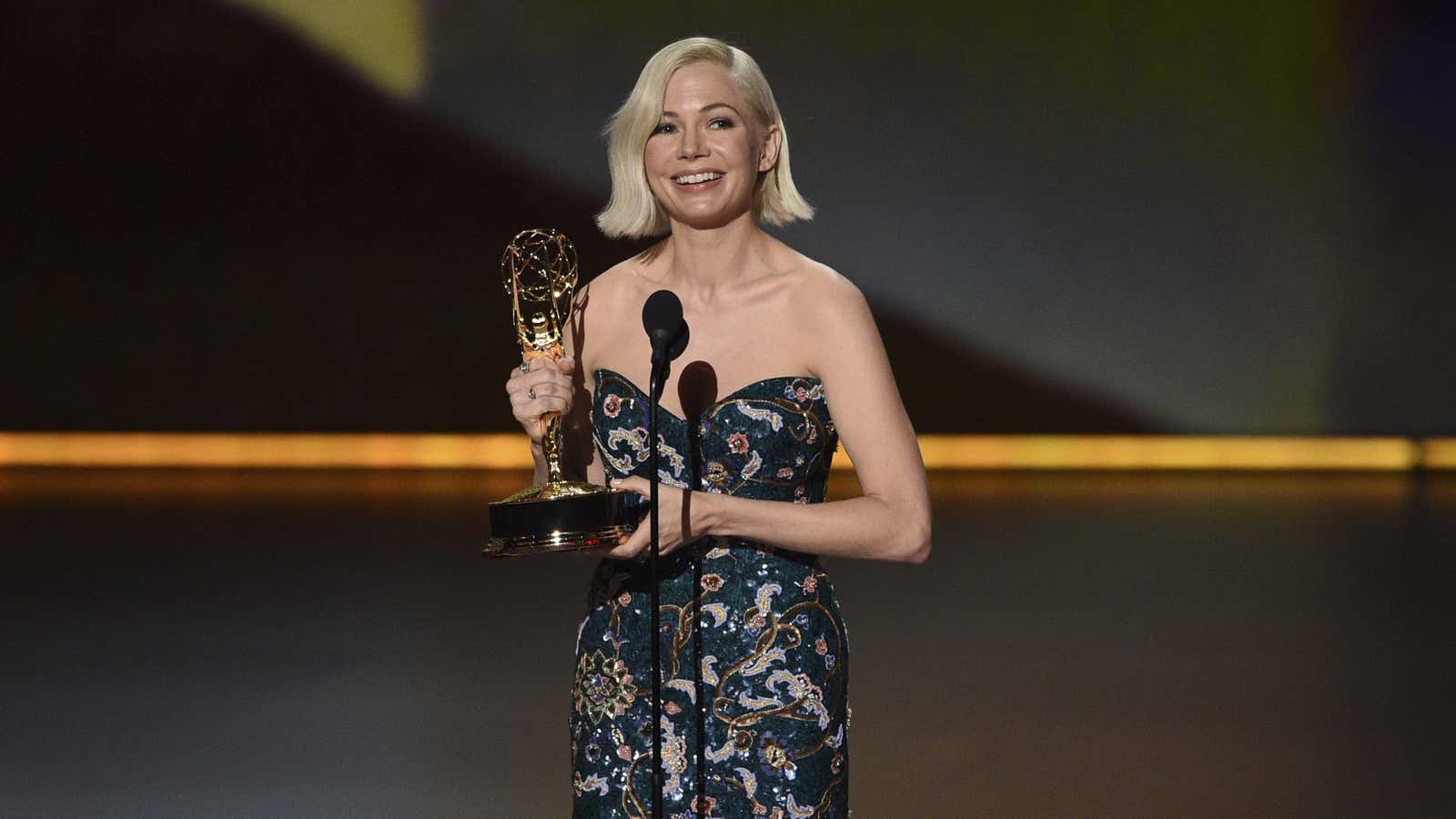There are a lot of reasons to pay women fairly: legality, child poverty, basic justice. But actress Michelle Williams’ speech at the 71st Primetime Emmys on Sept. 22 highlighted one oft-overlooked upside to equal pay: It benefits employers in the long term, too.
In her speech accepting the award for outstanding lead actress in a limited series or movie, Williams attributed her success in the role of Broadway star Gwen Verdon, in the FX series Fosse/Verdon, to the financial and professional support she received from FX and Fox 21 Studios. “I see this as an acknowledgment of what is possible when a woman is trusted to discern her own needs, feels safe enough to voice them, and respected enough that they’ll be heard,” she said.
Williams described how her bosses readily fulfilled her requests for dance and voice lessons that would enable her to play Verdon to the best of her ability; when she asked for props like a better pair of fake teeth or a new wig, they acquiesced. “And all of these things, they require effort and they cost more money, but my bosses never presumed to know better than I did about what I needed in order to do my job and honor Gwen Verdon,” she noted.
This was an extension of the fundamental support that Williams received in the form of equal pay. She described how meaningful equal pay was to her on both a practical level and a psychological one, as a reflection of her bosses’ faith in her talents. “When you put value in a person, it empowers that person to get in touch with their own inherent value, and then where do they put that value? They put it into their work.”
Indeed, it’s quite motivating to know that you are being compensated fairly for your work—and extremely demotivating to know that you’re undervalued. One working paper about the effects of salary comparisons, for example, found that people who found out that they were getting paid unequally to their peers put in less effort at work, with a resulting effect on performance. “Finding out that peers earn on average 10% more than initially thought caused employees to spend 9.4% fewer hours in the office, send 4.3% fewer emails, and sell 7.3% less,” the authors wrote in the Harvard Business Review.
Williams has firsthand experience with pay gaps. She made headlines in 2018 when USA Today reported that she received less than $1,000 for the reshoots of the Ridley Scott movie All the Money in the World, while her co-star Mark Wahlberg got paid $1.5 million.
The ensuing controversy highlighted how a lack of pay transparency consistently puts women at a disadvantage, as does the insidious expectation that women donate their time and money out of generosity rather than be compensated for it. While Wahlberg’s team negotiated a big fee for the reshoots—made necessary after the film’s star, Kevin Spacey, was dropped from the film amid allegations of sexual harassment and assault—Williams agreed to do the reshoots for a nominal fee in the spirit of being a team player. “I said I’d be wherever they needed me, whenever they needed me. And they could have my salary, they could have my holiday, whatever they wanted,” she said before news of the pay gap broke. “Because I appreciated so much that they were making this massive effort.”
No one thought to inform Williams that Wahlberg had gotten a big payday—”Everyone did it for nothing,” Scott told the press at the time. The revelation that she had been treated unfairly left Williams “paralyzed in feelings of futility,” she said. Wahlberg and his team ultimately made a combined donation of $2 million in Williams’ name to the Time’s Up Legal Defense Fund, founded in the wake of the #MeToo movement.
The injustice of that episode is important subtext to understanding the conviction with which Williams spoke about equal pay and the transformative effects of feeling valued at work. She concluded her speech not only by calling on employers around the world to treat women fairly and with respect, but by highlighting how companies and managers that do so will be repaid in the form of gratitude, loyalty, and hard work.
“And so the next time a woman—and especially a woman of color, because she stands to make 52 cents on the dollar compared to her white, male counterpart—tells you what she needs in order to do her job, listen to her,” Williams said in her acceptance speech. “Believe her. Because one day she might stand in front of you and say thank you for allowing her to succeed because of her workplace environment and not in spite of it.”
